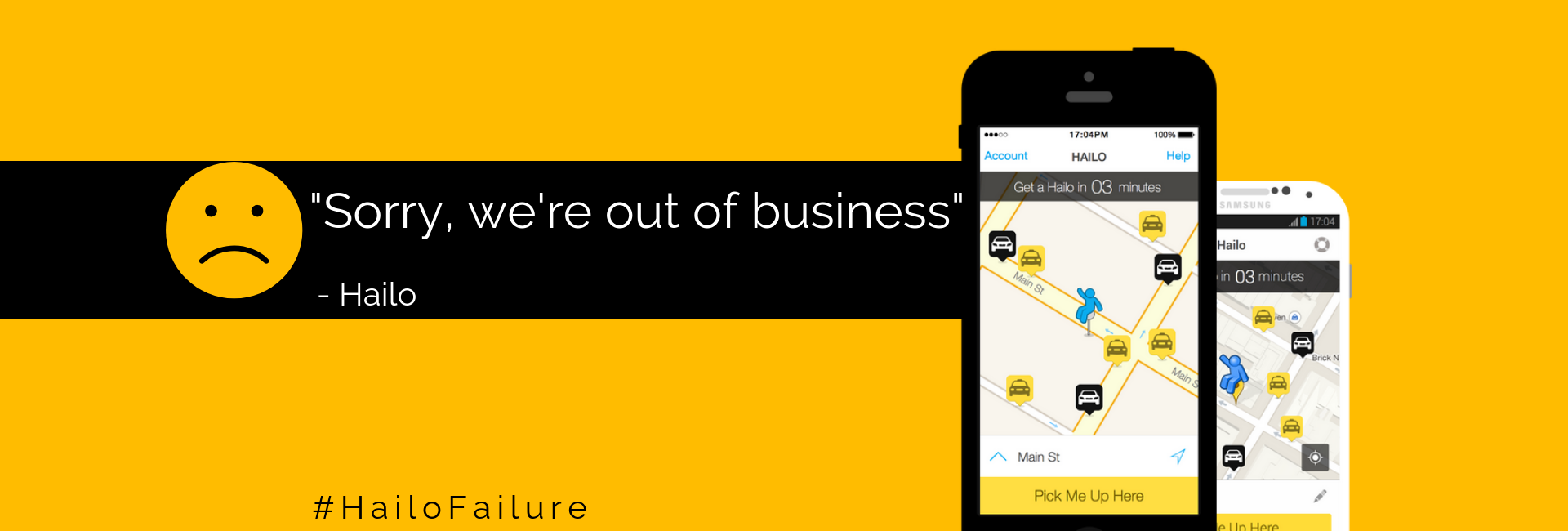Don't miss the chance to work with top 1% of developers.
Sign Up Now and Get FREE CTO-level Consultation.
Confused about your business model?
Request a FREE Business Plan.
From Mailing DVDs to a Global TV Network: Here is How NETFLIX Business Model Managed It All
Table of contents
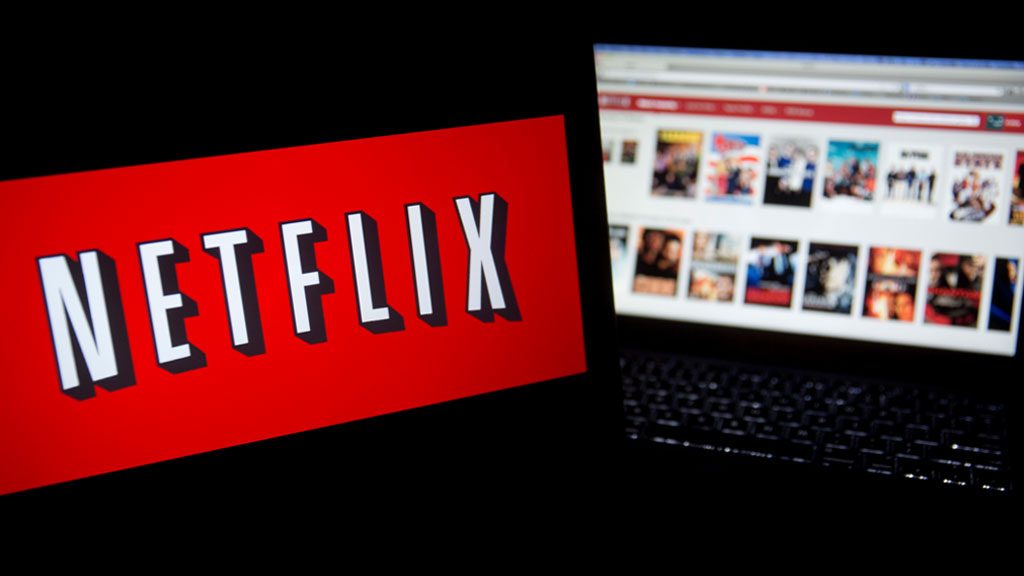
Every year a number of Americans cut the string with their cable company. Why? Because Netflix disrupted the way in which the world watches its entertainment. It is the world’s greatest film house without any cinemas. An organization that started as a website where people could lease DVDs through the email is currently said to be the first major disruption to media outlets around the world. Its business model is constructive and skyrocketing.
The organization has explored the change from DVDs to streaming to turning into a global TV network – leaving established competitors in the dust. But, it hasn’t been without hiccups en route.
It is a motivational example of an organization that effectively moved their business model various times and developed exponentially because of that. This, this, this and this is the proof.
There are obviously new entrants in the market, for example, Hulu Plus, Amazon Prime, and Facebook Watch, but Netflix is by far the pioneer, serving 175 million subscribers and creating 11.7 billion in revenues in 2017. Here is Netflix’s growth over the last three years:

Image credit: Investopedia
You don’t see growth like this too often, right? Netflix seems best of breed in its space and that’s why we are discussing it today. Here’s everything you need to know about NETFLIX business model. Let’s get started with how it was when started:
What Was Netflix – The Initial Business Model
Netflix was established in August 1997 as a DVD-by mail service. The very first business model of Netflix was to let people lease videos by choosing it on the web and having it delivered to their homes. This service was unparalleled at that time and a major move in the business.
It was the DVD by Mail Era driven by none other than NETFLIX.

After a year, Netflix presented a subscription model, where clients could lease DVD’s online for a fixed fee per month. Netflix launched its Internet-based membership service in 1999 and 239,000 movie lovers joined in the first year. During the first ten years, the company had built an amazing logistics chain with 50+ regional warehouses to distribute the DVDs to its subscribers.
And the rest is history…
But, what derived the exponential growth that the company has achieved today? Let’s investigate how Netflix moved their business model with the end goal to grow exponentially.
The Journey of Netflix
- From Rentals to Subscriptions
- From Envelopes to Streaming
- From Licensing to Original Content
- From Hollywood to Bollywood and much more.
Netflix Stats and Facts: Funding and Major milestones
Netflix just got $2 million in venture capital funding during its Series A funding round. Only three years later, amid its Series E funding round, it raised $50 million with 3 backers. The organization started offering a subscription-based DVD-via mail service in 1999.
In 2000, Netflix started utilizing a blend of collected big data and analytics tools to prescribe videos for customers to lease. It got 4 million subscribers in 2005. After disrupting the DVD-via mail market, Netflix launched online video streaming in 2007. It then officially expanded to global markets in 2010 with its Canadian launch and after that in many other countries.
The following stats outline the company’s most prominent milestones as it developed from a small DVD service to a streaming media giant.

In 2013, Netflix propelled its initial three original series, House of Cards, Orange is the New Black and Hemlock Grove. This pulled in 31 Primetime Emmy nominations for its original shows. In 2016, Netflix was made available worldwide except in a few nations.
Here is how it is working presently…
What Is Netflix – The Current Business Model
At present, Netflix is a global TV network that enables subscribers to watch films, TV shows, documentaries and more on an extensive variety of Internet-connected devices. The company additionally gives DVD rental plans where it supplies the shows and films on DVDs.
This On Demand video streaming Company works on a membership-based model. The subscribers pay for a month to month subscription plan and are offered access to content available on Netflix in the quality (HD, Ultra HD) they pay for.
Let us look at present Netflix Business Model for a clear picture:
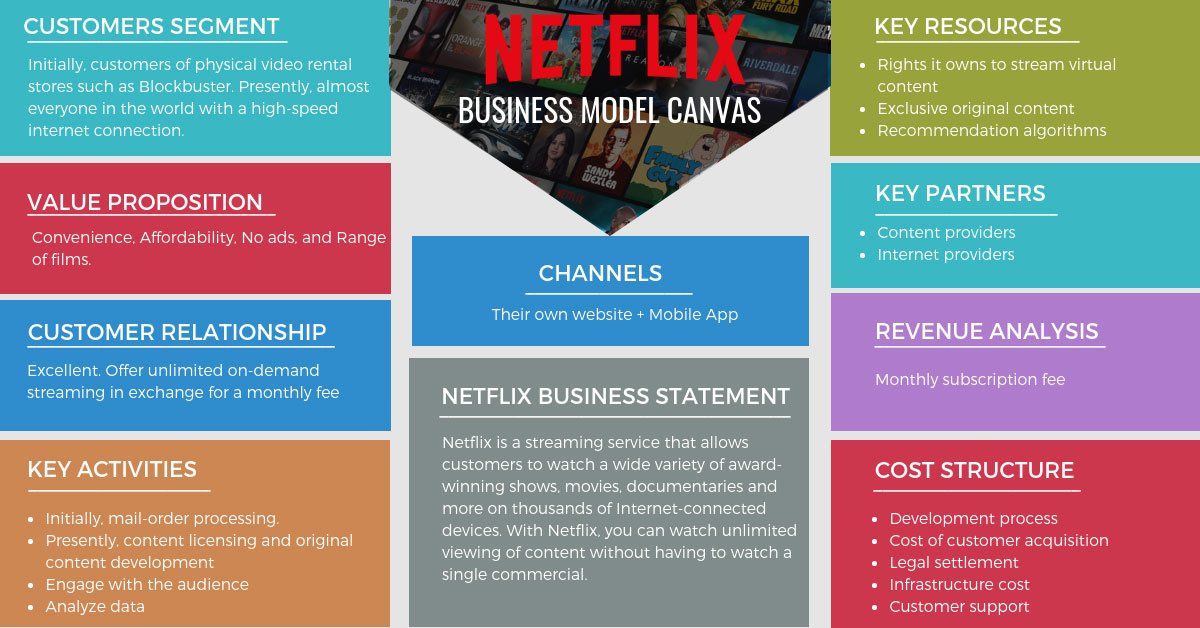
1. Netflix purchases content from content creating studios (Key Partners).
2. Netflix streams content to its Customer Segment. Clients who wish to see the content buy a monthly subscription plan.
3. Netflix tries to build its subscriber base through Value Proposition, careful and aggressive marketing efforts and is exceptionally successful at it.
4. Money earned from subscribers is utilized to purchase more and more content (Aggressive investments).
5. After gaining immense fame and stardom, it started producing its own content (Key activities). Strike licensing associations with other media channels, for example, Colors Infinity.
6. To tap the non-subscriber market, lease out DVDs (Another source of revenue).
7. Rental money is a source of revenue not only from non-subscribers as well as from one-time users.
8. Netflix is known for changing over one streaming format into numerous commercial streaming formats. Also, strangely, Netflix makes big profits through this model.
9. Another component of Netflix’s revenue model is strategic product placement. For example, season 1 of House of Cards had a lot of product placements highlighting Play Station 4, vehicle rental ads and so forth through which it earns money.
10. It always keeps evolving for creating an exponential business model with the help of its key resources.
Here are the five components for understanding the process better…
Five Components for Understanding Netflix Business Model
Netflix’s business model is all about understanding these five important components:
The Company Always Believed in Disruption
Netflix journey shows it all…
By February 2007, Netflix had distributed its billionth DVD. That achievement and that sort of growth should have caught the organization to define its business model around DVD distribution simply. But, the company was not at all trapped. It had recognized the power of analytics and data. It built up a superior recommendation engine, Cinematch to predict the pattern of DVD requests in a better way.
It even organized an open contest. Offered $1 million prize to the individual who could present an algorithm better than its existing one. It was a data-driven organization before data and analytics were in vogue. By 2009, it had more than 100,000 DVD titles and ten million clients. It could have proceeded on its trajectory. But, it didn’t.
Blockbuster and other video rental stores didn’t perceive possible disruption from a mail-order subscription organization like Netflix. Blockbuster even turned down a chance to acquire Netflix in 2000. It was the interruption of physical stores.
Its business model always revolved around Innovation, Disruption and transformation. INITIALLY as:
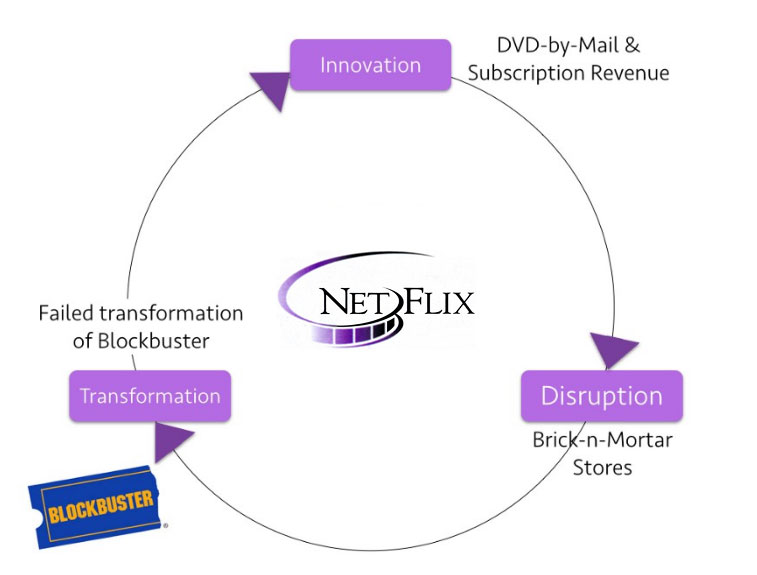
and PRESENTLY Netflix indicates mastery of unexpected competencies than what we saw with DVD-via Mail business model:
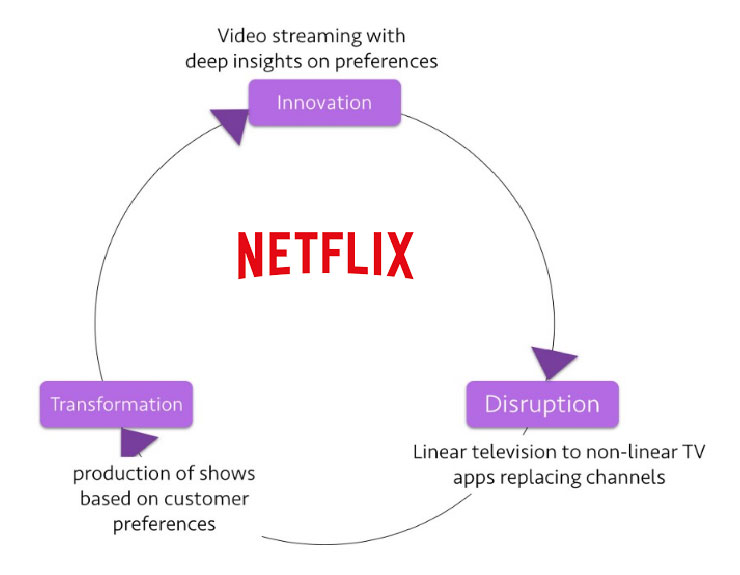
Target Audience Division
The organization’s target market includes females and males between the ages of 17-60 and families with an income level of $30,000 and up. With such enormous disparity among the people belonging target group, it can easily be concluded that Netflix segments its clients dependent on psycho-graphics and not on demographics.
Using psycho-graphics, users are sectioned in 3 fundamental groups –
- People who are too busy to go out and buy movies,
- People who are frequent renters, and
- People who need to get the most value for their money.
The Value proposition of Netflix
Aside from being one of the pioneers of the business with their subscription model, the value proposition is one more component which helped this specific service to become as famous as it is today. In fact, there are a total of eight elements that are making all the difference.
- Affordable price: Every fourth family in the US has a Netflix subscription that is the reason they have affordable prices.
- Accessibility: The service is available on the widest range of devices including TVs, PCs, gaming consoles and mobiles.
- Original Content: It Invests in own shows, based on analysis of their own user data.
- Large Amount of Content: It gives top-notch content in various genres.
- Personalized Suggestion: It gives you a lawful access to immense movies and TV shows database and the best-customized suggestion algorithm.
- A Seamless Service: It comes without the interruption of ads.
- Keeps Users Hooked: It releases exclusive and new series as full seasons and not one episode at once which keeps its clients hooked.
Netflix joins these building blocks to make an exponential business model. They kept and continue changing the segments that needed to change with the end goal to develop exponentially.
The behavior of Users (Big Data and Data Analytics)
Netflix is a technology juggernaut whose algorithms, analytics and digital-streaming developments have changed how clients watch films and TV shows. But, this technology has always been in service from an extraordinary perspective — building a platform that shapes what users watch, not exactly how they watch. Here is the thing that makes them unique:
- The organization has a tremendous amount of data on the viewing habits its 137 million subscribers.
- They know which films and TV shows their users love or hate.
- They even know for how long their users watch an individual episode.
This incredible data system makes a rich framework that impacts their overall algorithm.
Presence of this module is imperative for each business who wants to succeed. This module provides insights on who is watching what, how frequently and to what extent are audience watching it. Such insights enable you to plan and promote your business.
Now, Netflix is a Content Distributor as well as Creator
As content owners started crushing Netflix in content licensing negotiations and started making issues for the organization. Netflix needed to up their game and make content not seen anywhere else in order to keep their subscribers and draw in new clients. Henceforth, the organization chose to put resources into original content.
This way, Netflix understood way better their rivals what their clients would want next and acted upon this. The introduction of House of Cards series about the charming Underwood couple changed how we watch media. Providing the full series at once, Netflix gave us the chance to watch the entire series in one sitting, an experience presently alluded to as binge watching.
From a subscription model perspective, Netflix amped up their capacity to accomplish growth and users lock-in. Today the organization is one of the best 5 purchasers of media and plans to spend over $8 billion next year to create original content.
They as of now make utilization of and add to an expansive number of open source technologies and even have their very own Open Source Software Center. In 2017, Netflix publicly released Vectorflow in 2017, which is a deep learning library.
How Does Netflix Make Money?

The major source of revenue for Netflix is subscriptions. That is, subscribers pay to get content on Netflix and to get DVDs delivered to them and that is the way by which the organization makes money. Netflix’s major source of revenue is subscription which cost somewhere in the range of $8.99 and $14.99 every month.
As per Statista:
“In 2003, the company broke even, reporting a profit of seven million U.S. dollars. In 2017, the income amounted to 558.93 million U.S. dollars, whilst the company’s annual revenue reached 11.60 billion U.S. dollars.”
The organization offers 3 distinct plans for users based on the gushing quality of the content provided. The plans are –
- Basic – substance can be streamed in Standard Definition.
- Standard – substance can be streamed in High Definition.
- Premium – substance can be streamed in Ultra High Definition.
Trends Driving the Exponential Growth of Netflix
Why Netflix is so popular? The answer to this question is right here…
The key trends that are driving the exponential growth and are implemented in the present NETFLIX business model are:
Technology: Used to make content available flawlessly on various devices.
Ease of Use: Individuals don’t have sufficient time to go out and search for movies, they need comfort where content is displayed to them (customized).
On-Demand: Provide content anywhere and whenever you need with minimal monthly expenses.
Data-Driven: Utilized not only for recommendations but also effectively used to make content that fits individual preferences.
Lessons Taught by Netflix to Future Subscription Business Modelers
Great things do not happen overnight
Netflix proved that the subscription business model could grow and expand in a profitable way. But, this doesn’t happen overnight. If we look at the worldwide expansion of Netflix, we can see how it began to grow outside the US just in 2010. After thirteen years of its launch.
Also, it was just in 2016 that it launched all around the world. This is not random. The subscription business model requires financial resources. And with the right strategy, you can earn them.
No doubt, the model requires huge investments. When you offer a subscription, that will never come at a low cost. Rather, you will require consistent support, new ideas, development, and approaches to ensure your subscribers stick as long as possible.
If you want to disrupt an industry, you must be willing to disrupt yourself
Netflix could be the dictionary definition of a Silicon Valley disruptor, a new entrant that reshaped the rationale of the whole industry. However what’s really exceptional about the organization’s trajectory over the last two decades is the means by which drastically it has disturbed itself in service of its main goal.
Netflix started, obviously, with a truly simple innovation — crushing Blockbuster by shipping DVDs via mail and canceling late expenses. It then changed from mailing content to streaming TV shows and movies digitally. Today, Netflix is most significant as a maker of content; it will spend an amazing $12 billion this year alone on programming. Here once more, Netflix is entering an industry by challenging its traditions. It always comes at #1 in the list of innovators that disrupted their industries with quality mobile apps and websites.
Business model is about the value you provide – to EVERYONE
There is a misconception in the business world that a business revolves around its monetization strategy. However, it is much more than that and Netflix proved it.
Business model is the manner by which you adapt your business. It is about how you make your product available. It is about the value you provide not just for your customers but also for your investors and stakeholders.
Netflix isn’t just a subscription-based media provider. It is based on the concept of on-demand. It is also a content generation company giving each facility to its customer base by hook or by crook.
Keep innovating and growth means everything
Blockbuster neglected the importance of innovation and waited for too long before entering the gaming market. While Netflix embraced innovation and experimented with the Internet. One company was offensive and another defensive. And the rest is all we are talking about. Innovation won.
Right from the start, Reed Hasting focused on how his company could grow effectively. He created a business model that can be easily expanded over time. Presently, Netflix is available worldwide and is showing no signs of slowing down.
Why Netflix is so Popular?
- It has a wide variety of movies and shows.
- It is an e-service; can be used anywhere using a mobile phone, laptop or tablet.
- It is cheap and fast.
- It does not require cable or satellite service. Only an Internet connection is enough.
- It has a lot of classics.
- It has original content to show.
- It has a rating system.
- It keeps adding new shows and movies
- It’s easier than movie piracy.
- Its movies and shows are in HD.
- It suggests movies and shows to watch.
Netflix Debts: The Black or Bright Side of Netflix?
Before we discuss this aspect of Netflix, let’s have a look at a few stats:
Net Operating Profit Before Tax (NOPBT) For Netflix, CBS, and HBO

Credit: Forbes
The figure compares Netflix to HBO and CBS (its competitors) on the basis of net operating profit before tax (NOPBT). It shows that Netflix earns 1/3 the NOPBT of HBO and 1/4 the NOPBT of CBS. If we add the three companies income together, Netflix accounts for less than 13%.
Enterprise Value For Netflix, CBS, and HBO
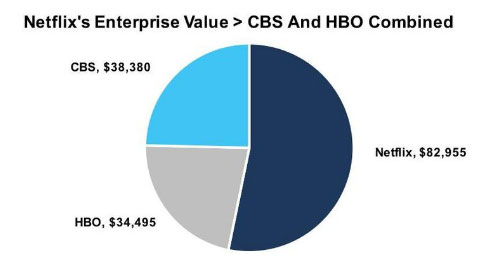
Credit: Forbes
On the other hand, In spite of the difference in their NOPBT, the market presently views Netflix as more profitable than CBS and HBO. Both CBS and HBO have independent streaming services. Both have gigantic hit shows (Game of Thrones for HBO, Big Bang Theory for CBS,) and extensive content libraries developed over decades.
Still, Netflix enterprise value is much more than that of HBO and CBS. Why so?
Because one of the principles followed by Netflix founders is that investment is more important than anything else if you want to grow. Profits are not everything. Netflix always puts content above costs, but is the policy sustainable?
Well, it is a little contradiction here.
According to a report, the expenditure and investment of Netflix is much more than it earns. An organization tends to depend on the money created by its business to pay its bills. However, Netflix can’t and won’t pay in this specific manner.
At its pinnacle year of free cash flow, it would take Netflix 100 years to pay all the cash it has committed to spend. Its owed money is about 10.5 times its highest ever cash flow.
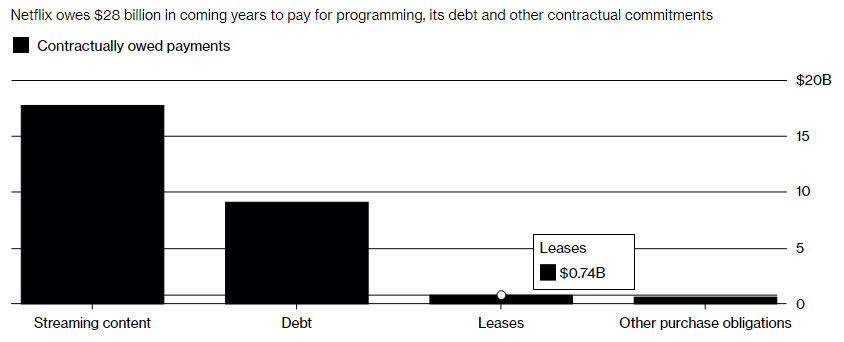
Credit: BloomBerg
Netflix has been able to splurge on hiring Hollywood stars and releasing a surge of new movies and series because the organization has been able to get money cheaply on account of quickly growing subscriber base.
A couple of individuals are in uncertainty whether Netflix and its investors are making a savvy bet or a ruinous one. But, the founders believe Netflix is on the right path to keep expanding. Netflix CEO Reed Hastings put it:
“In some senses, the negative free cash flow is an indicator of enormous success.”
People behind Netflix know what they’re doing. With more than 135 million subscribers around the world, Netflix still has space to learn and grow. Even after $20 billion in debt and the loss of Disney, it isn’t fading soon. Reason? Its ever-increasing subscriber base and people like Shonda Rhimes, Brack and Michelle Obama believing in it.
Wrapping Up
“Adaptation is Hard But Necessary.”
Netflix could well have faded away if it had focused on DVD-distribution and logistics. But, it concentrated on improving customer experience around entertainment. And that is what made Netflix what it is today – a global TV network provider with 137 millions of subscribers around the globe and is still growing.
Having added 6.96 million subscribers in only three months isn’t a simple thing that any business can accomplish. The organization outperformed its own growth targets by roughly half a million subscribers locally and 1.5 million new members universally, bringing its subscriber total to 137.1 million before the finish of the third quarter of 2018.
Are you inspired by the success journey of NETFLIX business model and curious to know how you can provide value to your clients and grow exponentially with an on-demand video streaming app or website like Netflix? Get in touch with us and find out how we can help you make the next big thing!
Rate this article!
(18 ratings, average: 4.61 out of 5)
Join 60,000+ Subscribers
Get the weekly updates on the newest brand stories, business models and technology right in your inbox.

Humane yet subtle, Naiya is a girl full of ideas about almost everything. After earning a bachelor’s degree in computer science and engineering, she decided to merge her technical knowledge with her passion for writing – to accomplish something interesting with the fusion. Her write-ups are usually based on technology, mobile apps, and mobile development platforms to help people utilize the mobile world in an efficient way. Besides writing, you can find her making dance videos on Bollywood songs in a corner.

App Monetization Strategies: How to Make Money From an App?
Your app can draw revenue in many ways. All you need to figure out is suitable strategies that best fit your content, your audience, and your needs. This eGuide will put light on the same.
Download Now!

